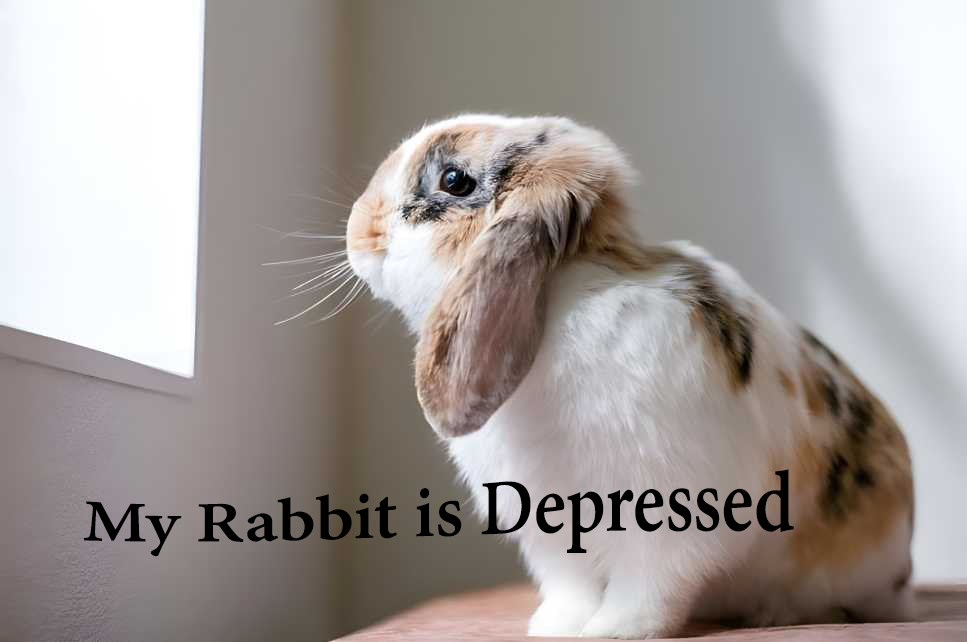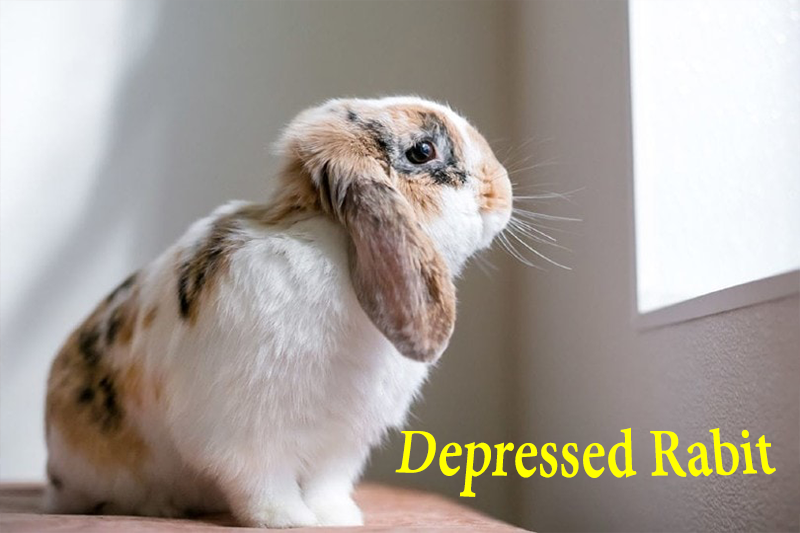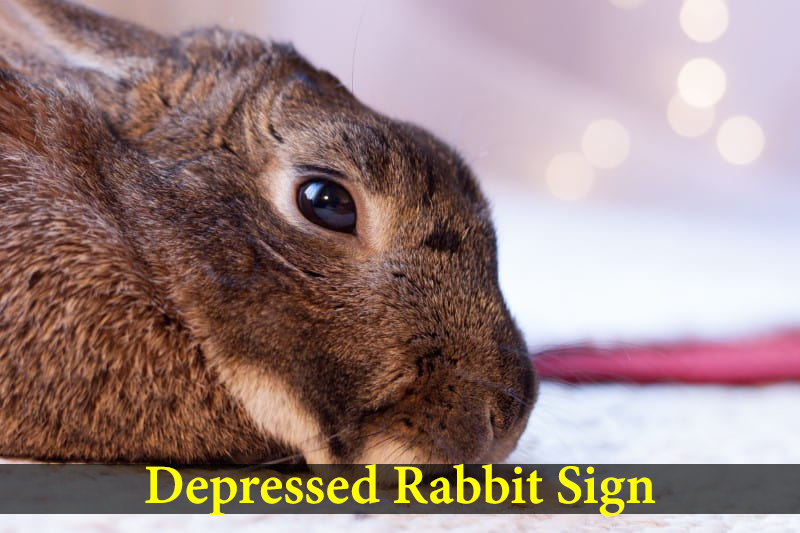You might have just moved or are planning to bring home a new bunny. Out of the blue, your lively and energetic Coney is withdrawn or listless. You might think Is your rabbit depressed?
Yes, even your rabbits can get the blues. Let’s learn about the common symptoms as well as the treatment for rabbit depression. What are the signs of a depressed rabbit? So, here is the detailed information to identify whether your rabbit is depressed or not.
Depression in rabbits isn’t much different from that in humans.
Rabbits, like us, can suffer from depression. While depression isn’t typically diagnosed in them, vets and behaviorists want owners to become aware of the signs and symptoms to look out for. With the right knowledge and treatment, you can help your beloved bunnies get out of a period of melancholy.
Rabbits are man’s good friend, but findings and research also reveal that a quarter of rabbit owners admit that they didn’t realize a rabbit could be suffering from bad health and poor mental conditions, with many assuming they are energetic and happy all the time.
Signs of a stressed rabbit- How do you know if your rabbit is depressed?
Signs of a depressed rabbit- the symptoms of depression in rabbits can be similar to us, from withdrawing themselves from social events to being quieter than normal- it can be painful to watch them like this. There are some tell-tale signs your rabbit is suffering from depression including;
- Exhibiting low activity levels.
- Lack of energy and curiosity
- Bald spots on areas of their body, also called fur pulling.
- Lack of appetite
- Showing anxiety or aggression through sporadic howling
- Excessive licking of paws
- Frustrated and bored
- Less interaction with other rabbits, companions, or owner
- Always found sleepy
- Loose interest in all the things once they enjoyed.
- Not self-grooming
- Loose interest in cleanliness and upkeeping
- Digging and destroying carpets
- Pacing and biting
Depression in rabbits can be triggered by a whole variety of different things, which include:
- A major change in the rabbit’s family background (like bringing a new baby, spouse, or pet).
- A distressful event, such as the loss of a member, companion, or owner.
- An environmental change, such as changing homes.
- empathy for an owner who is depressed or unhappy.
It may be difficult to imagine that your lively, happy, and cheerful friend could get the blues; however, rabbits are in fact capable of having depression in the same way that we humans do.
Why do rabbits get depressed?
There are several reasons that cause depression in a rabbit. Nevertheless, if your pet rabbit is not behaving properly; is less active than before; refuses to eat food, or has stopped grooming itself, you might want to consult a veterinary doctor for a comprehensive check-up to determine the possible diseases that could be causing these changes in behavior.
Rabbits have strong attachments to their environment. They don’t like changes such as moving to a new home or rearrangements of furniture. Even the addition of a new member, a new baby, or a roommate can cause a rabbit to go into stressful moods and depression.
Also Read - 10 Sign of a happy rabbit. Find out information on what are the sign a bunnies shows when they are happy.

Classic reasons for depression in rabbits include:
- The presence of another rabbit in the house, garden, or neighborhood that the rabbit feels is invading its territory
- If family members have changes in work schedules or unpredictable routines, i.e., sometimes the house is very busy and other times less so,
- For friendly rabbits, not enough human attention can upset them.
- For less friendly rabbits, too much attention from humans or other pets can lead to frustration.
- If they don’t have the opportunity to hunt, stalk, or chase, which are all-natural behaviors for a rabbit,
- They aren’t feeling good.
- They don’t have enough toys to play with.
- Past trauma effects
While rabbits are often portrayed as sociable animals, many rabbits develop close relationships with other mates. My rabbit (Dodo) was adopted 7 year ago. For seven years, we were inseparable.
We used to share our window seats and were very comfortable with each other. When my sister visited my house and saw the rabbit, she demanded that she get her home.
I also felt a little discomfort, but I agreed to get the rabbits home for a week. Dodo wandered the house for days to find me, became very unhappy, and developed a symptom of depression. Rabbits whose mates have passed away will react the same.
What is NOT depression in rabbits?
Anyone who cares for their pet will notice even small behavioral changes in them. However, this doesn’t really mean that your rabbit is depressed.
So, it’s important to look at your rabbit’s body language and eating behaviors in context before you come to the clear conclusion that your rabbit is unhappy and posing symptoms of depression.
Many times, there will be another reason for the rabbit’s behavior change that you may notice. Before you become overly concerned about your rabbit’s health, investigate the specific causes to see if there is another reason for their behavior change.
There can be changes in their behavior due to the following reasons; you may figure out that these behavioral changes are caused by reasons other than depression:
Seasonal changes in rabbits’ behavior; rabbits tend to be less active during summertime. It is important to know that a temperature exceeding 80 degrees can prove very fatal to them. In summer, they spend most of their time sleeping and sitting throughout the day. Therefore, it is normal to observe fewer activities on the part of a rabbit during summer; beware not to think of this as depression.
Elderly rabbits’ behavior is different from that of their younger counterparts. The young rabbits are found to be more active and full of curiosity. On the other hand, older rabbits are found to be less involved in their environment; their sense of taste and smell wane with time, which is considered a natural aging process and not a sign of depression.

Rabbits by their nature are frightened or scared of something such as the presence of other pets or barking dogs on the street will always find somewhere to hide themselves away. These behaviors when temporary should not worry you at all. Try to minimize stress and make the environment as comfortable as possible for your rabbit. Keep dogs away from rabbits.
Illnesses also cause changes in rabbits’ behaviors. It may be due to a lack of energy and loss of appetite if your rabbit has become sick or feels any kind of pain, discomfort, etc. If these symptoms occur, consult a vet for proper health care advice.
Activity levels during the hours around dawn and dusk or during the mid-afternoon are normally different from other times of the day. It’s quite normal that your rabbit may feel inactive and sleepy and not roam around very much during certain periods. It doesn’t mean that they are depressed; it’s normal behavior for them.
Best methods to cheer up your sad or depressed rabbit
If the vet can’t find any physical cause for the rabbit’s ill health and sadness, here are a few tips you can try to cheer up your rabbits:
An early walk
If you take your rabbits on a walk early in the morning, when the sun is shining brightly, it could definitely help them be active throughout the day. If you find it uneasy to do so, you can set an alarm merely a half hour earlier in the morning. Your beloved rabbit’s health is worth losing a few minutes of your sleeping time.
Spending time with them
Rabbits are social pets that demand to be accepted and loved. Try to spend most of your time with them and take them along with you when you go for a ride or explore something new and interesting. Get them involved with you; it reduces their stress level and makes them energetic and happy.
Offering treats
Bring delicious treats for your rabbits when you go outside. When your rabbits are playing or doing some kind of leisure work, praise them by giving them treats.
It is possible that your rabbit will associate acting normal with rewards and get out of a depressed state. Applying the same idea, you might not give them treats when they are unhappy or depressed; this might encourage your rabbits to make extra efforts and get the treats as a reward.
Introducing a new friend
As mentioned earlier, rabbits are sociable animals and should never be housed alone. If you get a new rabbit or other pet, this might encourage them to behave actively. If a rabbit gets a new partner, they can play together, groom each other, and form a valuable bond.
Giving them a new and interesting toy
Sitting and spending time in a room alone, only with food and water, can make your rabbit feel unhappy. To distract them from being alone and feeling bored, get them involved by introducing new toys and interesting puzzles to solve.
Providing them with more space
Most hutches and cages that were being sold at pet shops were found to be too small for a rabbit to live in. Rabbits can get depressed if they are cooped up. Move your rabbits to a new place where they can find large areas to do their activities.
They love to dig and tear out the parts. If it’s possible for you, provide them access to a 32-square-foot enclosure.
Also Read - How does Rabbit shows affection? Learn about bunnies expressions and how they shows their affection - a detailed guide.
Frequently Asked Questions
How can I tell if my bunny is depressed?
Depressed rabbits may overeat, pull at their fur, become hyperactive, slow their movements, stay still, or hide away. A depressed rabbit can be indicated by such behavior..
Other signs of stress can include appearing nervous, being excessively jumpy, and many others. These kinds of acts are generally abnormal for them.
Is there anything called a ‘low mood in rabbits’?
Rabbits experience depression just like humans do. Their behavior can be unusual or, say, in a ‘low mood’ when they are ill or having any kind of painful experience.
Their low mood can be indicated by the following reasons: they are in pain, they are not getting the proper diet, their living conditions aren’t good, and others.
Do rabbits like being held like babies?
Mostly, rabbits need extra care and attention as children; they want to be cuddled. You can bond with your rabbits by relaxing at home and petting them quietly. They calmly sit next to you for longer periods of time while you give them a soothing massage.
Do rabbits get depressed on their own?
Normally, rabbits can be miserable because they are unhappy and bored. Rabbits rely on us for most of their well-being. And a rabbit’s happiness is a combination of things, but mostly companionship. Do not let your rabbits have fun with you and any offspring.
Can a rabbit live happily alone?
Rabbits are social animals who enjoy playing with one another swapping out their toys. Rabbits become prone to behavioral abnormalities if kept away from other bunnies for long periods of time. You should bond at least two rabbits together. Rabbits are happier in pairs than being alone.
Is a rabbit a lucky pet?
The Chinese zodiac Tibetans believe that the luckiest pet is the rabbit Rabbits symbolize gracefulness, femininity, and mercy Additionally, children born during the year of the Rabbit tend to be very calm and peaceful indeed.
Final words
Rabbits encompass a creature that thirsts for your attention and care. In the wilderness, many rabbits live in colonies of small to medium sizes where they can interact, bond, and also feed together.
One disturbing trend is that rabbit owners ignore their social needs and provide them with an unsuitable environment, which leads to depression and ill health. Take care of your single or group rabbit in order to prevent it from occurring.
The owner should attend to rabbits if there are new pets or people who cause anxiety or discomfort among them. Furthermore, consult a veterinarian so as to train the rabbit positively towards accepting new people gradually.


